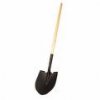Receiving and installing a rock crusher with attendant components like conveyors and screening plants.
I put one together in Grand Junction out of individual pieces sent in from all over the western United States. This plant then ran double-shift for several months passing thorough about 2 million yards of material. We moved it twice to keep it close to the stockpile. The only new piece was the screening plant, everything else was used and some was quite old. Just about all the older pieces needed serious repair, so it was obvious that whatever company project was using them before sending them our way did not send their best. My crew was quite good however at just about anything put their way and I had three excellent welder-fabricator-mechanics. In short order we had everything fixed properly, sited, and running.
Once set up the plant consisted of the feeder, the crusher, the screen plant, several standard conveyors and three radial-stacker conveyors. Also a good sized Cat D398 gen-set and a control tower set upon a parts trailer. We fed the plant with two Hough 560C loaders, two Cat D8N dozers kept the material flowing to the loaders.
The screening plant was a real challenge. We were running a lot of dusty sand over it along with considerable rock. The smaller rocks passed the jaw crusher intact and caused a problem on the screen deck conveyor by rolling back down and getting spit out under the bottom roller. This problem caused the death of one of the plant mechanics later on. Getting the screens set to the proper speed and frequency was difficult because of the sand. Run too fast and the sand didn't have time to filter out, Run too slow and the rocks didn't separate well.
All the conveyors needed constant attention, most were slightly bent one way or the other and a couple were bent in two directions. This made aligning the belts very difficult, plus they ran differently when loaded from no load. The radial stacker drive systems were all broken when they arrived, either busted chains and sprockets, bad motors and transmissions, or no drive chains at all. Two of them had obviously been tipped over at some point and were severely bent. Those had to be straightened and one required a whole new belt. One of the stackers showed signs that it had been moved from one position to another by dozer blade many times. That entire section had to be replaced. We replaced dozens of bad rollers and flanges.
Anyone having experience with screen plants knows that it's an art getting the correct screens for your particular material. We tried and wore out or destroyed a dozen different screen types -- some very expensive -- before finding some that would last about two weeks before needing replacement. Our material was actually a volcanic gravel, very abrasive. It had never had a chance to flow down a river and get some of the sharp edges worn off, plus the rocks that were broken in the jaw fractured with very sharp edges. Screen plants are like a high maintenance wife, always needing something. They, by nature of their function, are constantly trying to shake themselves apart, and they do this well.
It only took about 30 minutes of running initially for the project safety and environmental engineers to come driving over in a mad dash to shut the plant down. The sandy dust, actually a powder similar to Talcum powder, was causing a veritable dust storm that was moving down valley towards town. Big no-no! We then had to run a pipeline from our big water reservoir on site over to the plant and configure a spray irrigation system on the stock pile that kept the dust down. This was not perfect as the material actually repelled water about as well as a siliconed duck. The Cats and the loaders mixed it up pretty well, but we had to ad several misters and spray heads to the feed hoppers and the feed conveyors. The Cats actually ran their rippers into the top of the pile several times a day to allow water to drain down into the material. We also had to take one of our four 651 water wagon and dedicate it to spraying the piles of finished product so that dust did not blow off them. That 651 also wandered around the plant spraying water everywhere there was a possibility of dust flying out.
Keeping this menagerie operating was a chore and in addition to the plant crew of eight men I had one mechanic assigned there, it was he that died after being dragged thorough a return roller under the screen plant feed hopper. After his death, the plant shut down for a month or more while we figured out what happened and made many alterations in plant operating procedure and safety guards. From then on only plant personnel were allowed inside the fenced off area. Stricter operating rules were enacted and followed religiously.
It was quite a learning experience and a highly interesting one. Our production rate once all was running well was prodigious and we actually finished running all the material plus more way ahead of the original schedule despite being shut down for so long. It was kinda sad tearing it all apart the last time and saying good by to the hands that had worked so hard keeping it going. But that's part of being a dirt stiff.

